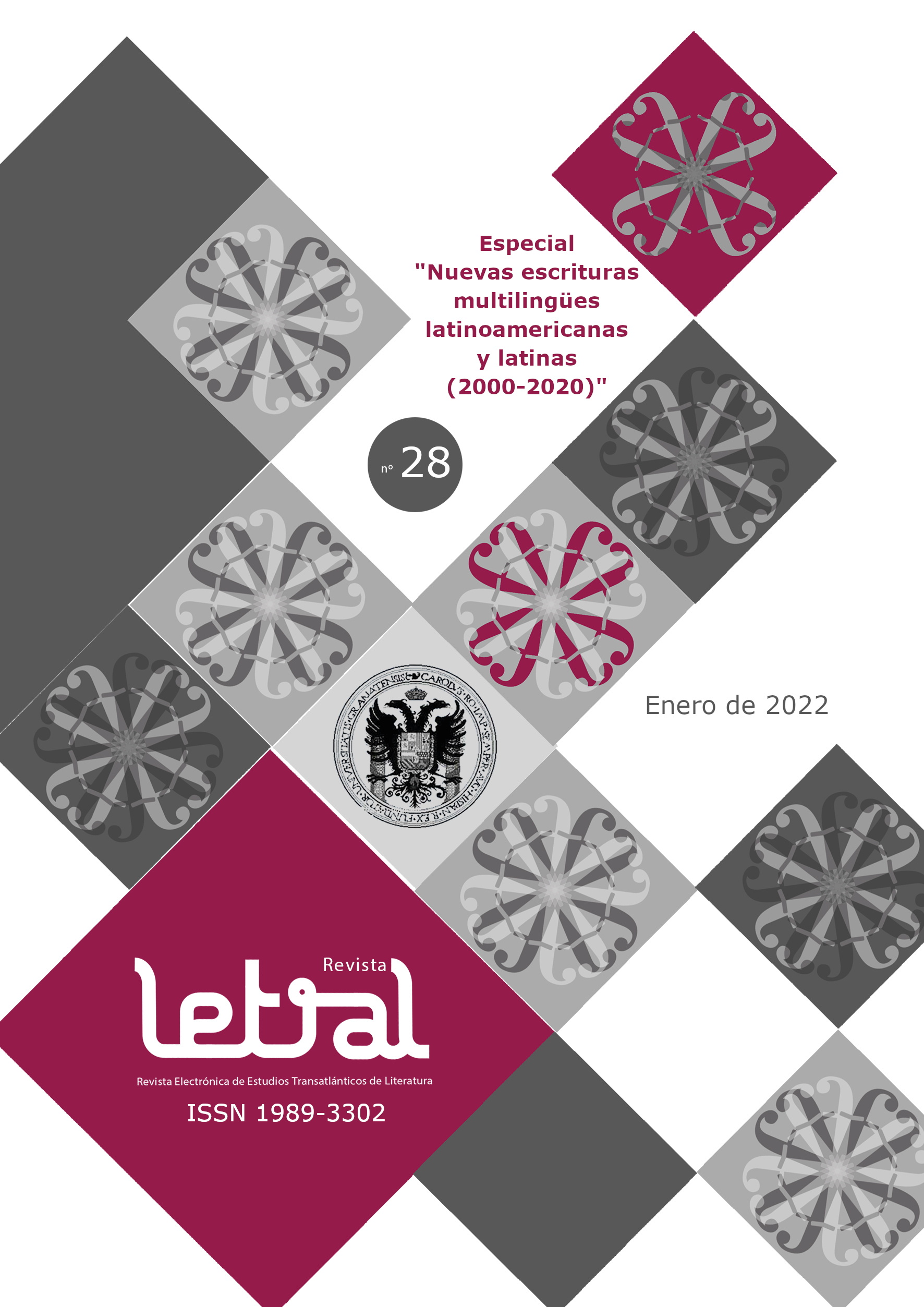Gender, Identity and Multilingualism in Recent Chicana Writing
DOI:
https://doi.org/10.30827/rl.vi28.21369Keywords:
multilingualism, translingualism, U.S. Latinx writing, women's writingAbstract
What role does the Spanish language play in the work of young Latin American female authors born in the United States? What impact does this double belonging, both culturally and linguistically, have on the reception and circulation of narratives? This article seeks to answer these questions based on the analysis of the works of two Chicana writers whose texts reflect on the relationship between language, gender and identity: Myriam Gurba and Kali Fajardo-Anstine. In Mean, Gurba constructs stories that constantly mention the linguistic transit and that are sometimes produced by this movement between languages. In Fajardo-Anstine’s short story collection Sabrina & Corina, Spanish is present as a latent force. Both writers deal with the formative experiences of young Latinas in the United States. In this context, the linguistic tension, in addition to a stylistic function, represents a central node for understanding the intersection between gender and identity.
Downloads
References
Anzaldúa, Gloria. Borderlands/La Frontera: The New Mestiza. San Francisco, Aunte Lute, 1987.
Anzaldúa, Gloria. Light in the Dark. Durham, Duke University Press, 2015.
Brah, Avtar. Cartographies of Diaspora: Contesting Identities. London, Routledge, 2019.
Butler, Judith, Gayatri Chakravorti Spivak e.a. Quem canta o Estado-nação? Língua, política, pertencimento, Vanderley J. Zacchi & Sandra Goulart Almeida (trads.). Brasilia, Editora Universidade de Brasília, 2018.
Cantú, Norma. “Memoir, Autobiography, Testimonio”. The Routledge Companion to Latino/a Literature, Suzanne Bost & Frances R. Aparicio (eds.), Nueva York, Routledge, 2013, pp. 310–22.
Ch'ien, Evelyn Nien-Ming. Weird English. Cambridge, MA, Harvard University Press, 2005.
Cuevas, T. Jackie. Post-Borderlandia: Chicana Literature and Gender Variant Critique. New Brunswick, Rutgers University Press, 2018.
Fajardo-Anstine, Kali. Sabrina & Corina. Nueva York, One World, 2019.
Glissant, Édouard. Introduction à une poétique du divers. París, Gallimard, 1996.
Gurba, Myriam. Mean. Nueva York, Coffee House Press, 2017.
Herrera, Cristina. Contemporary Chicana Literature: (Re)Writing the Maternal Script. Amherst, Cambria Press, 2014.
Jones, E. “‘I want my closet back’: queering and unqueering language in Giannina Braschi’s Yo-Yo Boing!”. Textual Practice, 2018, 1–19.
Moraga, Cherríe. Native Country of the Heart. Nueva York, Farrar, Straus and Giroux, 2019.
Porto, Maria Bernadette. “Hospitalidade e translinguismo literário no imaginário de autores francófonos na contemporaneidade”. Translinguismo e poéticas do contemporâneo, Ana Maria Lisboa Mello & Antonio Andrade (eds.), Río de Janeiro, 7Letras, 2019.
Scavone, Lucila. “Maternidade e o feminismo: diálogo com as ciências sociais”. Cadernos Pagu, n. º 16, 2001, pp. 137-150.
Torres, Lourdes. “The Construction of the Self in U.S. Latina Autobiographies”. Women, Autobiography, Theory: a Reader, Sidonie Smith and Julia Watson (eds.), Madison, WI, University of Wisconsin Press, 1998, pp. 276-87.
Torres, Lourdes. “Latinx?”. Lat Stud, n. º 16, 2018, pp. 283–285.
Yildiz, Yasemin. Beyond the Mother Tongue: The Postmonolingual Condition. Nueva York, Fordham University Press, 2014.
Downloads
Published
How to Cite
Issue
Section
License
Revista Letral is an open access journal under a Creative Commons Atribución-NoComercial 4.0 license.
The works published in this journal may be reused, distributed and publicly presented for non-commercial purposes, provided that: cite the authorship and the original source of the publication (journal, publisher and URL of the work).
We strongly recommended you to share our published articles in social and scientific networks, institutional and public repositories, personal or institutional websites, blogs, Google Scholar, ORCID, ResearchID, ScopusID, etc.
The journal allow the author(s) to hold the copyright and to retain publishing rights without restrictions.
We are completely free, both for readers and authors.














